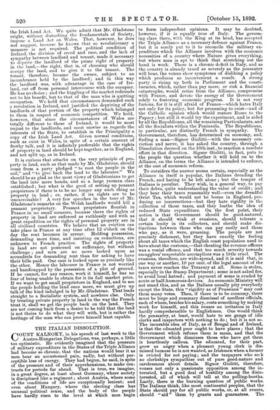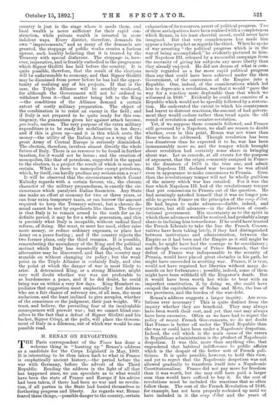THE ITALIAN DISSOLUTION.
COUNT KALNOKY, in his speech of last week to the Austro-Hungarian Delegations, was, perhaps, a little too optimistic. He evidently imagined that the pressure of military expenditure in the States of the Triple Alliance had become so chronic, that the nations would bear it as men bear an accustomed pain, sadly, but without per- ceptible loss of energy. They had begun, he said, in spite of the pressure and of their apprehensions, to make con- tracts for periods far ahead. That is true, we imagine, in a great degree, at least about Germany, where society is disciplined like a regiment ; about Austria, where some of the conditions of life are exceptionally lenient; and even about Hungary, where the electing class has unusual political sense, and the body of the people have hardly risen to the level at which men begin to form independent opinions. It may be doubted, however, if it is equally true of Italy. The govern- ing class there, with the King at its head, has accepted the Triple Alliance as a necessary defence against France, but it is sorely put to it to reconcile the military ex- penditure which the Alliance involves with the economic necessities of a country where Nature gives everything, but where man is apt to think that stretching out the hand is work. There is a chronic deficit in Italy, and as the country is already taxed as severely as the peasantry will bear, the voters show symptoms of disliking a policy which produces so inconvenient a result. A strong party is rising up both in Parliament and the consti- tuencies, which, rather than pay more, or risk a financial catastrophe, would retire from the Alliance, compromise with France, and devote the energy of the Government solely to fostering economic progress. It is not very furious, for it is still afraid of France—which hates Italy not only for its policy, but for presuming to exist—and of the Catholic opinion which would restore Rome to the Papacy ; but still it would try the experiment, and is aided by all the Republicans, all the remaining Particularists, and all the Socialists within the Peninsula. The Republicans, in particular, are distinctly French in sympathy. The Government, therefore, has determined on economy, and, finding a man—Signor Giolitti—with the necessary con- viction and nerve, it has asked the country, through a Dissolution decreed on the 10th inst., to sanction a resolute effort in that direction. Signor Giolitti, in fact, puts to the people the question whether it will hold on to the Alliance, on the terms the Alliance is intended to enforce, at the cost of economic reform.
To outsiders the answer seems certain, especially as the Alliance in itself is popular, the Italians dreading the French, and hating to be left alone ; but the temper of Italians is peculiar. They wish, in a general way, to pay their debts, quite understanding the value of credit; and they bear their taxes reasonably well—even the dreadful Grist Tax, which would not be borne in England, pro- ducing no insurrections—but they hate rigidity in the collection of those taxes, and they loathe the idea of reduced State expenditure. On the first point, their notion is that Government should be good-natured, that it should wink at evasions, should tolerate ,a certain lenity in its collectors, and should make dis- tinctions between those who can pay easily and those who pay, as it were, groaning. The people are not precisely dishonest, but they have exactly the feeling about all taxes which the English coast population used to have about the customs,—that cheating the revenue officers was a venial offence, and that too much severity towards smugglers' respectable accomplices was a little cruel. The evasions, therefore, are wide-spread, and it is said that, in one way or another, 10 per cent. of the legal amount of the taxes never reaches the Treasury at all. Some is stolen, especially in the Stamp Department ; some is not asked for, to avoid local hatred ; and payment of some is evaded by acute or half-humorous devices. An economic Ministry will not stand this, and as the Italians usually pity everybody except the State, this " rigidity as of Prussians " may cost them many votes. Then, if there is to be economy, there must be large and summary dismissal of needless officials, each of whom, besides his salary, costs something by making work for himself, and this rouses an irritation in Italy hardly comprehensible to Englishmen. One would think the peasantry, at least, would hate to see gangs of idle clerks and inspectors with nothing to do ; but it is not so. The incurable idea of Italy, as of Bengal and of Ireland, is that the educated poor ought to have places ; that the Government which refuses them is mean, and that the Government which dismisses those who have got them is heartlessly callous. The educated, for their part, grow as angry when a pleasant young clerk is dis- missed because he is not wanted, as Irishmen when a farmer is evicted for not paying; and the taxpayers who set k no clerkships sympathise out of pure good-nature and carelessness about details. Signor Giolitti, therefore, rouses not only a passionate opposition among the in- terested, but a good deal of hostility among the disin- terested, all of which will tell at the polling-booths. Lastly, there is the burning question of public works. The Italians think, like most continental peoples, that the State should pay for all public works, or, at all events, should " aid" them by grants and guarantees. The country is just in the stage where it needs them, and local wealth is never sufficient for their rapid con- struction, while private wealth is invested in more indolent ways. Every district, therefore, demands its own " improvements," and as many of the demands are granted, the stoppage of public works creates a furious uproar, each locality believing that it is treated by the Treasury with special disfavour. The stoppage is, how- ever, imperative, and is frankly embodied in the programme which Signor Giolitti has laid before the country. It is quite possible, therefore, that the result of the elections will be unfavourable to economy, and that Signor Giolitti may be dismissed from power before he has had the oppor- tunity of realising any of his projects. If that is the case, the Triple Alliance will be sensibly weakened, for although the Government will not be ordered to withdraw from it—that matter being left to the King —the conditions of the Alliance demand a certain extent of costly military preparation. The object of the combination is to resist an enemy in the field ; and if Italy is not prepared to be quite ready for this con- tingency, the guarantees given her against attack become, pro tanto, useless. The very purpose of the extra military expenditure is to be ready for mobilisation in ten days ; and if this is given up—and it is this which costs the money—the utility of the Italian Army as a wing of the great Army of Central Europe is seriously diminished. The election, therefore, involves almost directly the whole future of Italy. There is no resource to be found in further taxation, for it would not be borne ; and the creation of monopolies, like that of petroleum, suggested in the appeal to the electors, is a project the result of which is most un- certain. What is there to monopolise except petroleum, which, by itself, can hardly produce any serious sum a year ?
It will be observed that the circumstance which Count Kalnoky regards with a certain favour, viz., the chronic character of the military preparedness, is exactly the cir- cumstance which paralyses Italian financiers. Any State can make an effort at economy for two or three years, or can bear extra temporary taxes, or can borrow the amount required to keep the Treasury solvent, but a chronic de- mand cannot be met by expedients like these. The theory is that Italy is to remain armed to the teeth for an in- definite period, it may be for a whole generation, and this is precisely what Italy is incapable, without radical fiscal reform, of doing. She must, to meet her need, either raise more money, or reduce ordinary expenses, or place her Army on a peace footing ; and if the country rejects the two former plans, only the third remains. It is possible, remembering the ascendancy of the King and the political instinct which Italy has repeatedly displayed, that an alternative may be discovered, and that the country may stumble on without changing its policy ; but the weak point in the Triple Alliance is certainly Italy, and also the point at which the danger of war is most likely to arise. A determined King, or a strong Minister, might very well doubt whether war was not preferable to so burdensome a peace, and if he did doubt, he could bring war on within a very few days. King Humbert re- pudiates that suggestion most emphatically ; but debtors who see a fair chance of solvency are, of all men, the most audacious, and the least inclined to give scruples, whether of the conscience or the judgment, their just weight. We trust, and believe, the prevailing fear of its incalculable consequences will prevent war ; but we cannot blind our- selves to the fact that a defeat of Signor Giolitti and his backer, Signor Crispi, at the polls, will place the Govern- ment of Italy in a dilemma, out of which war would be one possible road.



































 Previous page
Previous page